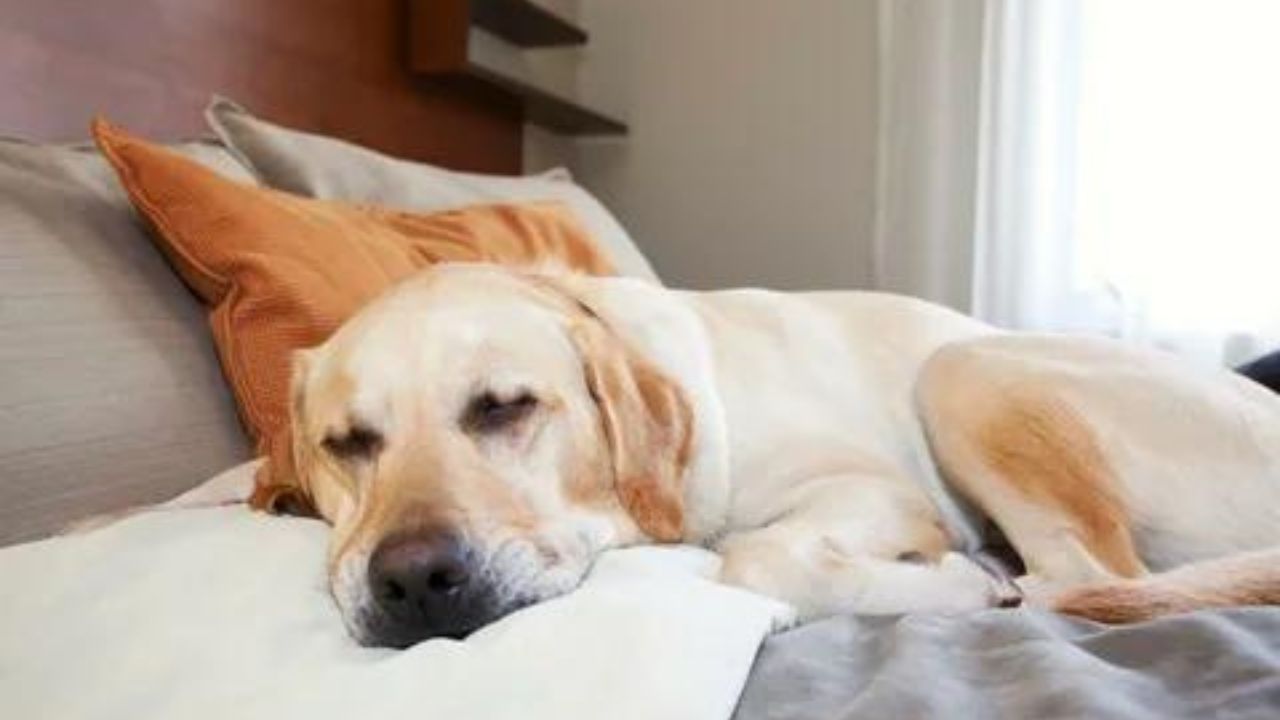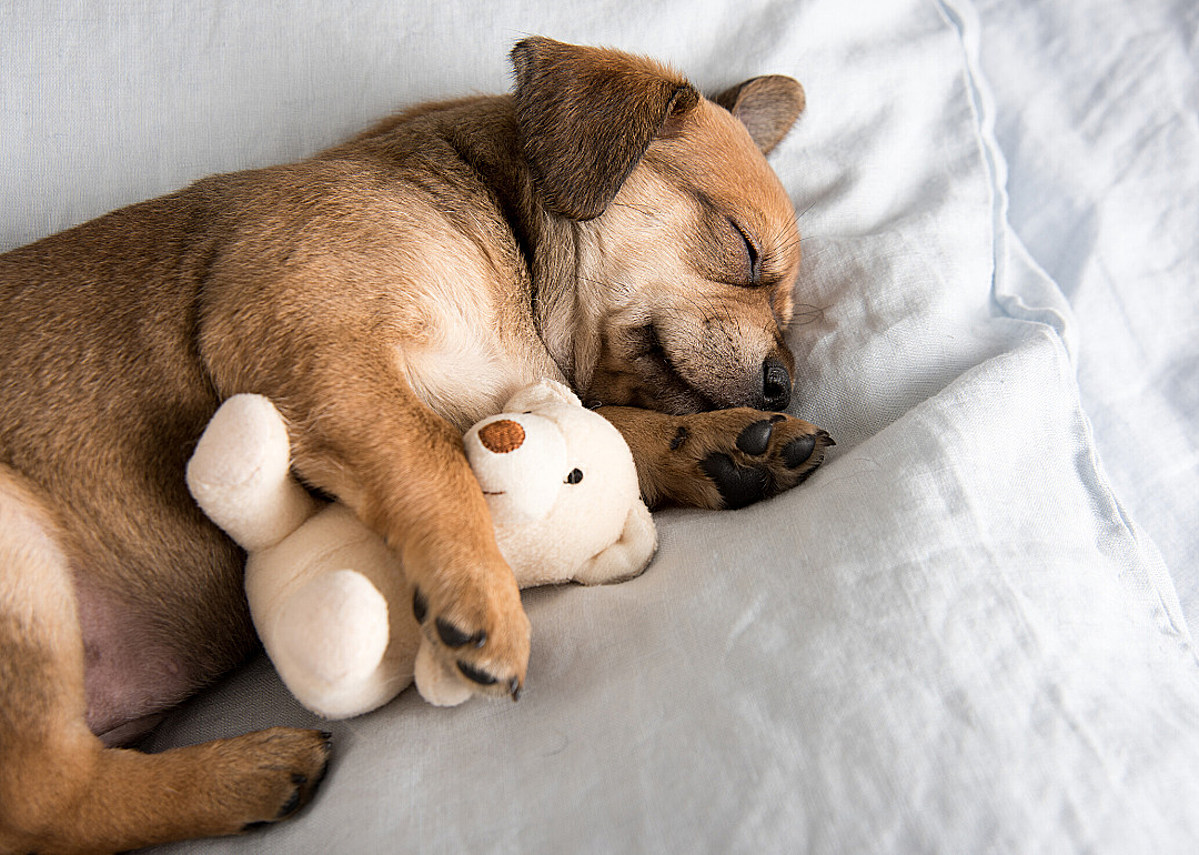
Congratulations! You’ve brought home a new bundle of furry joy – a puppy. With their wagging tails, playful personalities, and adorable faces, puppies will surely bring endless fun and love to your life. However, If you own or want to adopt a new puppy, you might soon find yourself asking the age-old question: when do Puppies sleep at night?
As it turns out, the answer could be more complex than you might think. Like human babies, puppies have different sleep patterns depending on their age, breed, and temperament. Some puppies might sleep through the night within a few weeks of coming home, while others might take several months to settle into a regular sleeping routine.
But fear not! In this article, we’ll cover everything you need to know about puppy sleep patterns and when you can expect your furry friend to start sleeping through the night. We’ll also provide tips and tricks for helping your puppy get the rest they need and advice for dealing with common sleep problems like night waking and separation anxiety.
So please grab a cup of coffee (or maybe a squeaky toy), and let’s dive into puppy sleep!
How Much Sleep do Puppies Need, and What Patterns of Sleep?
Puppy sleep patterns can be quite different from those of adult dogs. Like human babies, puppies need more sleep than adult dogs to support their growth and development. As a result, puppies can spend up to 18-20 hours per day sleeping, depending on their age and breed.
Puppies have different stages of sleep, including rapid eye movement (REM) sleep and non-rapid eye movement (NREM) sleep.
During REM sleep, puppies might twitch, whine, or even bark as they dream. REM sleep is an important part of the sleep cycle because it helps puppies process and store new information. NREM sleep is a deeper, more restorative sleep that helps puppies recharge their batteries.
Puppies’ sleep needs can vary depending on their age. Younger Puppies might need to sleep for longer periods throughout the day, while older puppies might be able to stay awake for longer periods.
Generally speaking, puppies need around 18-20 hours of sleep per day when they’re very young, but this can decrease to around 12-14 hours per day as they age.
Certain Breeds of Puppies might have different sleep patterns. For example, some breeds might be more active at night and prefer to sleep during the day. As a result, it’s important to consider your puppy’s individual needs and preferences when creating a sleeping routine.
Paying attention to your puppy’s sleep needs and providing a comfortable and safe sleeping space can help ensure your furry friend gets the rest they need to grow and thrive.
How Long it Takes Puppies to Sleep
One of puppy ownership’s biggest challenges is interrupted sleep as your puppy adjusts to their new environment. Knowing when your puppy will start sleeping through the night can be tough, but a few factors can influence the process. The first factor is your puppy’s age. Generally speaking, younger puppies need to go out more frequently during the night to relieve themselves.
As your puppy ages, it’ll gradually be able to hold its bladder for longer periods, so it’ll need to go out less frequently during the night. Typically, puppies can start sleeping through the night between 4-6 months of age, but this can vary depending on the individual puppy.
Another factor that can influence your puppy’s ability to sleep through the night is its breed. Some breeds of dogs are naturally more prone to restless sleep or may need more activity during the night. If you’re struggling with getting your puppy to sleep through the night, it’s worth researching your puppy’s breed to see if any specific strategies can help.
In addition, your training techniques can also have an impact on your puppy’s ability to sleep through the night. For example, if you’re taking your puppy out for frequent potty breaks during the night, it’s important to avoid making a big fuss or providing lots of attention. This can create an association between nighttime waking and getting attention, encouraging your puppy to continue waking up.
With time and training, your puppy will learn to settle into a regular sleeping routine, and you’ll be able to get the rest you need to be the best puppy parent possible!
Tips for Helping Sleep
As a puppy owner, there are a few things you can do to help your furry friend get a good night’s sleep. Here are some tips for helping puppies sleep through the night:
Stick to a consistent routine: Puppies thrive on routine, so it’s important to create a consistent sleeping schedule. Try to put your puppy to bed at the same time every night and wake them up at the same time every morning.
Provide a comfortable sleeping space: Your puppy’s sleeping space should be comfortable, quiet, and free from distractions. Consider investing in a cozy bed or crate your puppy can call their own. Make sure the sleeping space is in a quiet area of your home and away from loud noises or distractions that might keep your puppy up.
Get plenty of exercise during the day: Puppies have lots of energy, which can help them sleep better at night. Take your puppy for walks or play fetch during the day to help burn off excess energy.
Limit water intake before bedtime: To avoid frequent trips outside at night, limiting your puppy’s water intake before bedtime is a good idea. Ensure your puppy has access to water during the day, but avoid leaving a water bowl out at night.
Avoid nighttime play and attention: While it can be tempting to play with your puppy during the night, this can encourage your puppy to stay awake and make it harder for them to sleep. Avoid engaging in play or providing lots of attention during the night, as this can create an association between nighttime waking and getting attention.
Remember, With time and training, your puppy will settle into a regular sleeping routine, and you’ll both be able to get a good night’s sleep.
Common Sleep Problems
While most puppies eventually learn to sleep through the night, some may experience sleep problems that make it difficult to get the rest they need. Here are some common sleep problems in puppies:
Whining or barking: Puppies may whine or bark during the night if they need to go outside to relieve themselves or feel anxious. To address this problem, ensure your puppy has gone outside to use the bathroom before bedtime, and consider leaving a chew toy or blanket with your scent in their sleeping area to help them feel more secure.
Restless sleep: Some puppies may have difficulty settling down and getting a good night’s sleep. This could be due to anxiety or pent-up energy. Try incorporating more exercise and playtime into your puppy’s daily routine to help tire them out and promote more restful sleep.
Sleepwalking or night terrors: Just like humans, puppies can experience sleepwalking or night terrors. This could include things like barking, growling, or moving around while they’re asleep. If your puppy is experiencing these issues, try to create a calm and soothing sleeping environment, and consider speaking with your vet to rule out any underlying medical conditions.
Separation anxiety: Puppies may experience separation anxiety when left alone, making it difficult to sleep through the night. To help alleviate this problem, gradually get your puppy used to being alone by leaving them alone for short periods and gradually increasing the duration.
You may also want to leave a piece of clothing with your scent in your puppy’s sleeping area to help them feel more secure. With time and training, you can help your puppy develop healthy sleeping habits and get the rest they need to be happy and healthy.
Conclusion
Getting a good night’s sleep is essential for your puppy’s health and well-being. While every puppy is different, most will learn to sleep through the night by the time they’re 4-6 months old. It’s important to be patient and consistent when helping your puppy develop healthy sleeping habits and to remember that sleep problems are common in puppies.
Remember, it’s important to speak with your vet if you have any concerns about your puppy’s sleep habits, particularly if you suspect an underlying medical condition. With time, training, and patience, you can help your puppy develop healthy sleeping habits and get the rest they need to be happy and healthy.
So go ahead and give your furry friend a goodnight kiss, and rest assured that they’ll be sleeping soundly through the night with your help!








